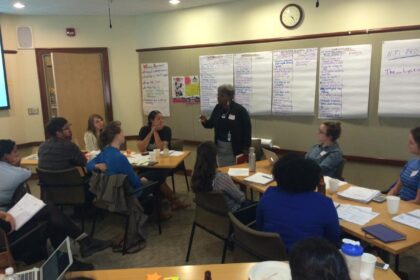
Kicking off our new Network Profile project is Marilyn Moore, a dynamic, committed food system change agent from Bridgeport, Connecticut. Marilyn Moore is Founder and CEO of The Witness Project of Connecticut, a culturally competent community-based breast and cervical cancer education program for African American women. For the past 15 years she has worked to reduce the incidence of late stage breast cancer by assisting uninsured women get access to early detection screenings. Marilyn’s interest in addressing health disparities among people of color led her to a network of people around Connecticut who address food security and health inequity. An advocate for health equality and social justice, Marilyn is the Project Director for one of five ACHIEVE communities in Connecticut who work in collaboration with stakeholders and community organizations. The Bridgeport ACHIEVE coalition was successful in establishing a Food Policy Council under the City Charter for the City of Bridgeport. She is also a member of the Connecticut Food System Alliance and Chair of the Board of Directors for End Hunger Connecticut!
On November 4, 2014, Marilyn Moore was elected as State Senator in Connecticut’s 22nd State Senate District which includes all of Trumbull, a large section of Bridgeport, and a portion of Monroe.
Why do you do what you do?
I consider my work to be social activism. In the past 17 years I have conducted breast health education as a lay health advisor to thousands of women in Connecticut. While trying to link them to services, I recognized the barriers within the health care systems were biased; both intentional and unintentional, barriers that can be directly linked to health disparities. I had two choices; ignore them or begin to address them. I chose the later and began to advocate on behalf of those who did not have a voice. It is my mission, it is my ministry.
What are your most urgent concerns or upcoming action opportunities?
Inequities in access to food is my greatest concern. Poor access to affordable, quality food for those who live in food desserts, cuts to SNAP benefits, and legislators who seem to not understand how poor food access creates poor health outcomes. Poor health outcomes impact us as a nation. Currently I am working with our local community to train those who are most impacted by SNAP cuts and lack of access to affordable, healthy foods on how to advocate for sustainable food systems. The first step will be to engage them in dialogue with the newly formed Food Policy Council in Bridgeport, Connecticut.
How can the FSNE Network help you overcome or address those concerns or help you with the action?
The Network is laying the groundwork necessary to sustain work done in the New England states by bringing people together and learning from each other to create policies/practices that will benefit all. Beyond that I believe there is an opportunity to go deeper in addressing the root causes of inequities. First, by understanding that the systems that created inequities are alive and active. Each person involved in this work has a responsibility to look within and address their role in perpetuating those systems. If we keep that in the forefront of our work FSNE will be instrumental in creating an equitable food system.
Featured image of boats in Portsmouth, NH’s fishing fleet by Jessica Boynton.




